Fans drove into the parking lots of the Capital Centre in Landover on a warm Saturday evening on April 18, 1987, expecting to see the thrills and excitement of playoff hockey in the first Game 7 in Washington Capitals history.
What they got was a blend of terrific hockey, a surreal six-hour battle and two teams with future Hall of Famers looking to simply survive what is still considered one of the greatest NHL games ever played as the game reaches its 35th anniversary Monday evening (and Tuesday morning).
The Capitals and New York Islanders battled through nearly seven periods of hockey, throwing everything they had at each other with 133 shots on the two goaltenders until fans finally could go home at 1:56 a.m. on Easter morning after Pat LaFontaine ended the game with a turnaround shot from inside the blue line that beat Bob Mason for the game-winning goal.
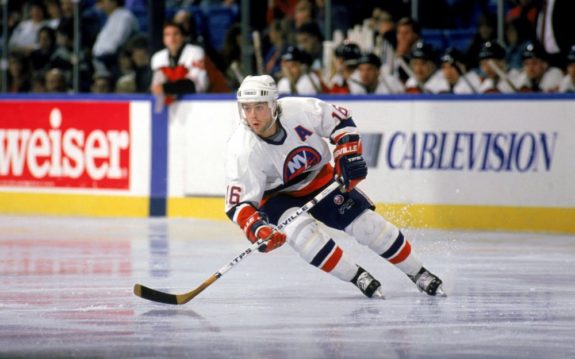
It became the fifth-longest NHL game at the time, and while there have been other longer games played since, it still remains one of the most memorable through the years and eventually became known as the “Easter Epic” – even though the game started at 7:35 p.m. the night before. The game even made the corner of the cover of Sports Illustrated the next week, which was a rarity for the Capitals, who previously were only featured when Bryan “Bugsy” Watson was shown chasing Montreal Canadiens’ Guy Lafleur in a 1977 cover.
While the end result wasn’t what Capitals fans wanted, it was a rare sporting event where the two combatants said it would have been a shame for either one to lose. Both were aware of the growing surreal stature of the game as time marched on, with neither team able to score a goal despite several prime opportunities in 68 minutes of extra time. When the dust had settled, both realized they had participated in a contest that would be considered one of the greatest NHL games ever played.
Kelly Hrudey set an NHL record for saves that lasted until 2020, and Bob Mason recorded 54 saves of his own, several of the spectacular type, despite a major equipment malfunction that left him wondering if he could stop anything towards the end of regulation.
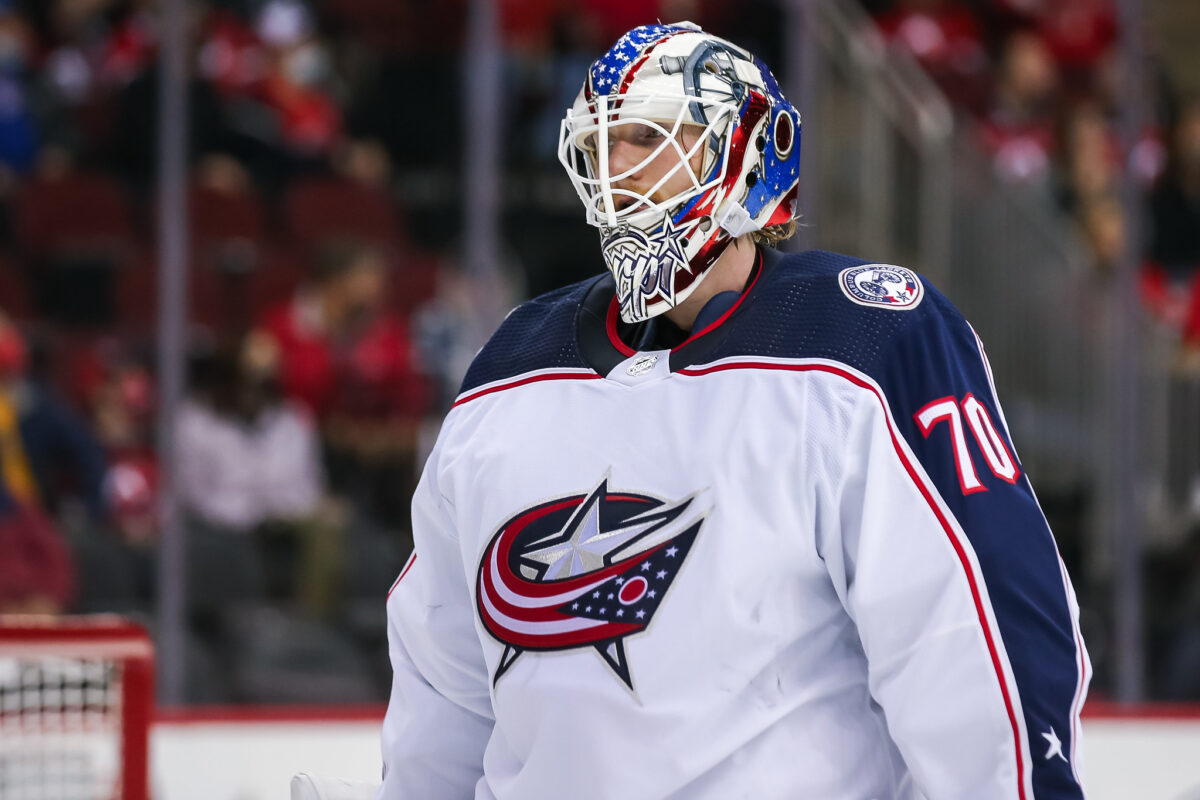
The sell-out crowd of 18,130 fans who packed the Captials’ old home in Landover certainly got a lot more than they bargained for when they pulled up to the arena over six hours before the game would end.
‘Greatest Hockey Game Ever Played’
Mike Fornes, who was on the air for what became a seven-hour telecast for Washington’s Home Team Sports, recalled the evening as the greatest game he ever saw, even with 1,500 games broadcasting under his belt, calling the Hartford Whalers, Capitals and Dallas Stars as his other NHL stops.
“That was a one-of-a-kind experience. Once in a lifetime experience, really,” Fornes recalled in a phone interview with the Hockey Writers. “It wasn’t ever the longest-ever game, but it was pretty close … to go four overtimes that was incredible.
I have tape of that game, and on the label, I titled it the ‘Greatest Hockey Game Ever Played.’ Because to me, it was. I haven’t had another experience like that. There were so many chances for both teams to win it.”
While the action was memorable for everyone in the building, its legend also grew thanks to the television audience across the world who were watching the game for the surreal scene between two rivals battling it out to advance to the second round of the playoffs unfold on their screen.
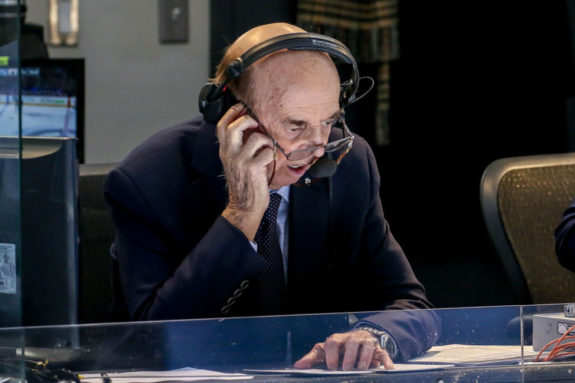
It was the only game in the Stanley Cup playoffs that night since the other series had all been decided, so it was broadcast not only to the home markets but also across the United States on ESPN and CBC’s “Hockey Night in Canada.”
It quickly became must-see television in an era when cable television was just becoming a staple in American households, and also in which the NHL was beginning to increase its reach, as the game that seemingly wouldn’t end went out of primetime and into late-night television for most of the country.
The image of ESPN analyst Bill Clement in just his white undershirt and tie wrapped around his head, as puzzled Capitals fans walked the old broadcast table in the stands on the Capital Centre concourse during the second overtime intermission, is what a lot of people who watched on national television remember – and is still immortalized on YouTube.
Of course, while it took over 10 days and then six more hours to decide that Patrick Division Semi-Final, there was a long history between the two clubs leading up to that Game 7.
Capitals, Islanders on Collision Course
While the Capitals just began to emerge as a Stanley Cup contender in 1982 with the acquisition of Rod Langway from the Canadiens, the Islanders were already there as a powerhouse having won their third straight Stanley Cup that year, and they proved to be a major roadblock in the Patrick Division playoffs for Washington.
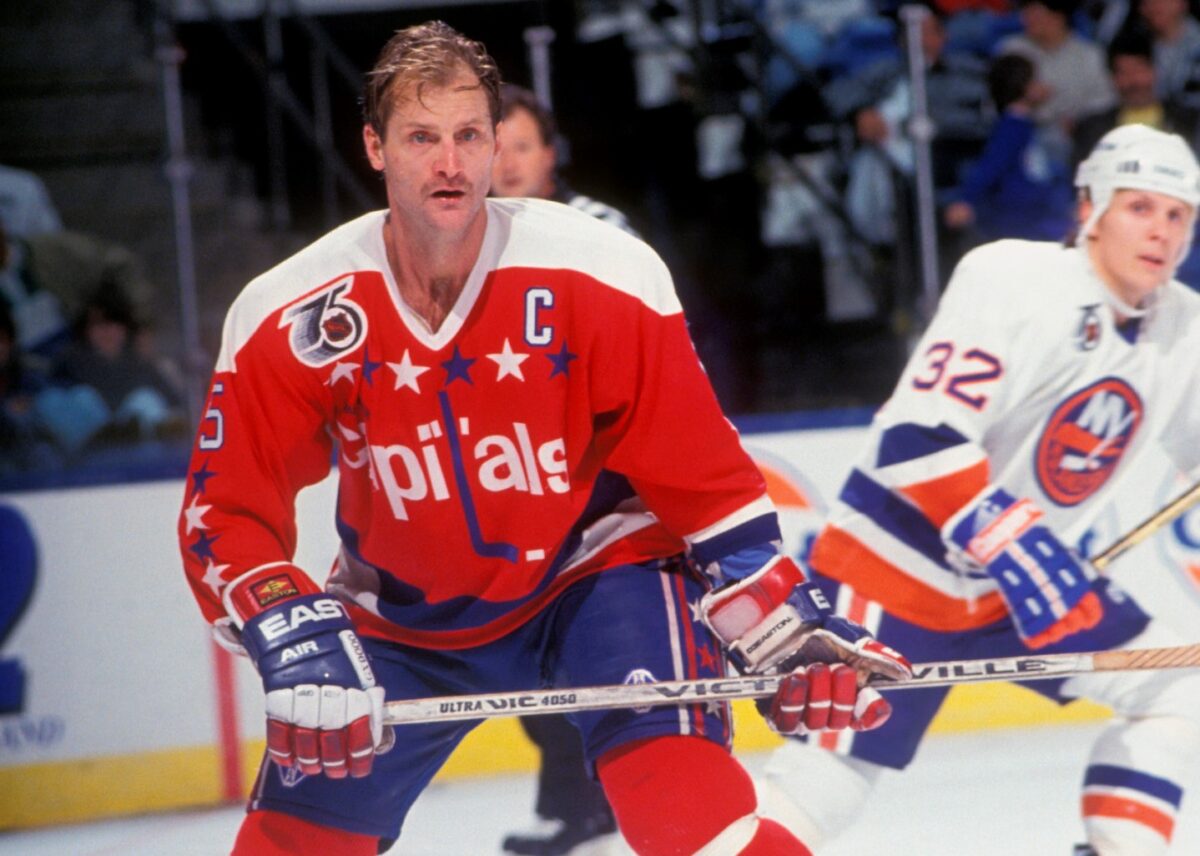
1987’s clash was the fifth straight season that the two met in the postseason, with the Islanders taking the first three series before the Capitals finally earned a series win by sweeping them out in 1986 – which to this day remains their last playoff sweep of any kind.
The Capitals first qualified for the playoffs in 1983 and faced the Islanders in a best-of-five series, splitting the first two games at Nassau Coliseum before the Islanders took the series with two straight wins at the Capital Centre. The lone win for Washington on April 7, a 4-2 win in Uniondale, wasn’t only the first-ever playoff win in Capitals history, it also was the only game the Islanders lost at Nassau Coliseum that playoff run as they won their fourth straight Stanley Cup by beating Wayne Gretzky‘s Edmonton Oilers.
The next season, the Capitals swept the Philadelphia Flyers in the best-of-five first-round series for their first-ever playoff series win, while the Islanders survived a scare from the New York Rangers with an overtime winner in the decisive Game 5. To open the Patrick Division Final, they took Game 1 at the Capital Centre, but the Islanders won the next four games to advance to face the Canadiens in the Conference Final. The Isles won that series – their 19th straight, still an NHL record – to reach the Stanley Cup Final for the fifth straight season, but this time, the Oilers turned the tables on New York, ending its dynasty and beginning one of their own.
The Capitals and Islanders met again in the 1985 playoffs in the best-of-five first-round with Washington taking a 2-0 series lead with a pair of overtime wins at home, but then dropped three straight, including a 2-1 decision in Game 5 at the Capital Centre in which Billy Smith frustrated the Capitals, stopping 39 of 40 Washington shots.
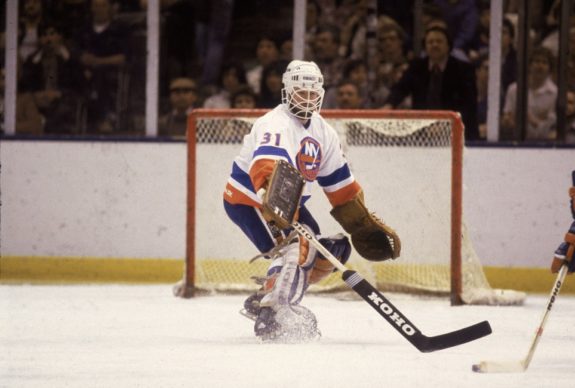
Washington got its revenge in 1986, winning the first two at the Capital Centre and this time finishing off New York with a sweep after a 3-1 win at Nassau Coliseum in Game 3 to advance to the Patrick Division Final.
In 1986-87, the two teams finished second and third in the Patrick Division, marking their fifth-straight playoff meeting. While the Capitals were making strides toward finally making a deeper playoff run, the Islanders’ dynasty was beginning to fade with newer players replacing some of the team’s aging core.
With the NHL implementing a best-of-seven format for first-round series that season, Washington opened with a Game 1 win at the Capital Centre, but the Islanders broke a 1-1 tie late in Game 2 to square the series. The Capitals took two straight wins at Nassau Coliseum, including a 26-save shutout by Bob Mason in his first-ever NHL playoff game in Game 3, and returned home with a 3-1 lead with a chance to close out the series.
But the Islanders showed off their playoff experience in storming back to force Game 7, fighting off a Capitals comeback in Game 5 in Landover, and then rallying from a 3-2 deficit in Game 6 at Nassau Coliseum to square the series at three apiece.
First Game 7 in Capitals History
That set up what was the first Game 7 in Washington’s five-year playoff history since they had only taken part in two second-round series at that point, one of which ended in five games (1984 against the Islanders) and one that ended in six (1986 against the New York Rangers).
A sellout crowd filed into the Capital Centre mostly wearing white, and waving white “spirit” towels that were handed out at the gates, and were loud as the two teams faced off. The two teams were playing for the right to face the Flyers in the Patrick Division Final, and Philadelphia coach Mike Keenan was on hand to scout the two possible opponents.
Washington had the edge in play during the first period, and the Capitals broke through with just 48 seconds left in the frame.
Just after the one-minute announcement, Scott Stevens made a centering feed from the far boards that wound up across the ice, and Greg Adams fired a puck from the near boards at Hrudey, which he stopped but couldn’t control. Gartner was skating at the top of the crease and was able to sweep the puck past Hrudey as he was being taken down by Gerald Diduck for his fourth goal of the series with 48 seconds left in the period.
The Capitals had the lead at the first intermission, with a significant 15-5 edge in shots.
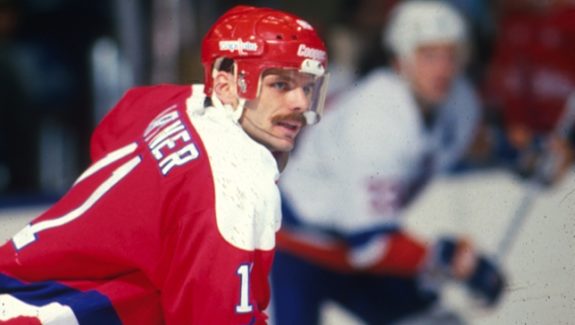
The second period opened with a bang – literally – as Stevens decked Patrick Flatley while standing on one of the Capitals logos at center ice. The hit created a prime Capitals’ scoring opportunity as Flatley recovered enough to make a bee-line towards the bench, but him going off while a rush developed led to a 2-on-0 break with Gartner and Mike Ridley on Hrudey, but the Islanders netminder made the save to keep the deficit at one.
Flatley recovered from being hit earlier in the frame and got the Islanders on the board at the 11:35 mark, faking a pass and then taking a shot on Mason past Stevens. Mason, who had not been busy up until that point, wasn’t expecting the shot from the slot and the puck got through his pads for the equalizer.
However, the Capitals, who were the stronger team through the first two frames – outshooting the Islanders 22-9 through the game’s first 35 minutes – answered back with another late tally.
With just 1:15 left in the second period, Grant Martin, who was recalled from the American Hockey League’s (AHL) Binghamton Whalers that morning and was originally listed as a scratch on the game’s score sheet, made an impact. Martin, playing in his first – and as it turned out only – Stanley Cup playoff game, bumped Islanders defenseman Randy Boyd off the puck behind the goal line, kicked the puck to himself, and then skated out in front and fired his first NHL goal past Hrudey, giving Washington a 2-1 lead going into the intermission.
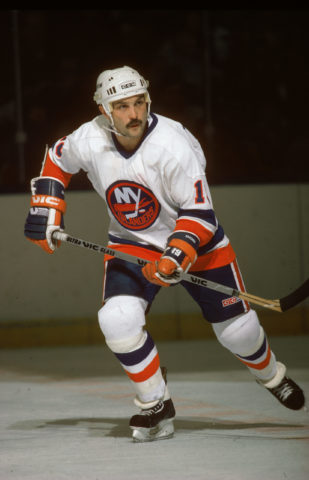
The goal came at 9:17 p.m., so while it seemed the Capitals might advance with a strong edge in play through 40 minutes, the game turned out to have over four-and-a-half hours left to play. Washington was up in shots 25-10, but the Islanders were a veteran team and put together their best frame in regulation in the third.
The 2-1 lead held for just under an hour, as at 10:13 p.m., 56 minutes in real time after Martin’s goal and with just 5:23 left in regulation, Bryan Trottier scored with a low backhand shot that eluded Mason, who slid backwards awkwardly into the net after the puck entered the cage. As it turns out, Mason had broken a skate rivet on the shot, and after a delay to see if they could fix the issue on the ice, he played with one good skate for the rest of the period, as at the time the goaltender wasn’t allowed to go to the bench for a fix without putting in backup Pete Peeters, who would be entering a critical stretch cold.
The Islanders couldn’t take advantage of Mason’s equipment issue, although he did make a couple of good stops while basically skating on one leg. The Capitals pushed hard for the go-ahead goal as overtime loomed, with Dave Christian hitting the goal post with less than two minutes to play amidst a strong flurry of chances late.
Despite the late push by both teams, they headed to overtime tied at two. The Capitals had the edge in shots of 36-25 through regulation, but both goaltenders saw more pucks fired at them over the next 60 minutes of play – and neither made a mistake during that stretch.
Surreal Overtime in Landover
What really made the game a classic wasn’t the first 60 minutes of regulation, as while regulation time was a good playoff battle, the shots, chances and drama just seemed to increase as the clock ticked past midnight.
“The quality of the overtime,” Al Koken, who did color commentary for Home Team Sports and still is part of the NBC Washington broadcasts today, recalled about the game to The Hockey Writers. “They had more shots in the first three overtime periods than they did in the entire game.
It started to not even get close, as each overtime started the Capitals started to get better and better and you just kept thinking ‘How could they not score a goal there?’ It wouldn’t be a 20-second shift and get me off the ice. There was quality chances, and obviously Kelly Hrudey was fantastic.
As the years went on and running into Bob Mason as the goaltending coach for Minnesota for so many years, we always said it was a strap that got caught. He said the rivets in his skate blade and he literally couldn’t move, and he had to finish the game with them [after a temporary fix in the intermission].”
Koken also compared Martin to a former Washington Redskins backup quarterback who had thrilled fans with his off-the-bench heroics in the preseason.
“Also, the name Grant Martin could have been a cult hero, he could have been like Babe Laufenberg. The only game Grant Martin could have given you the 2-1 game-winning goal.”
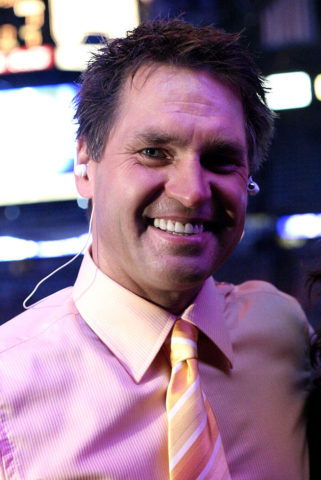
For a broadcaster calling overtime filled with chances but nothing but a couple of matching minors and one misconduct on the scoresheet, Fornes knew he had to be on his toes.
“The big thing, you knew it could end any second,” Fornes recalled. “It could be over any second. I remember Greg Smith hitting the post on a dump in from center ice. It was a line change, and it went off the post. It could have gone in and ended the game right there.
You had to be on your toes, it was the type of thing that could have ended at any moment.
The goalies were just fabulous. To see how Bob Mason played and Kelly Hrudey played, it was unbelievable. The officiating… Andy Van Hellemond reffed that game. He wound reffing some of the biggest games of my career. Later we used to talk about those overtimes. How you have the legs to skate those overtimes that long. That was unbelievable.”
Washington came out of the dressing room to start overtime flying, and Gartner had a great chance early in the first 30 seconds of overtime, but a bouncing puck eluded him from getting a good scoring chance. Bob Gould had another prime chance on Hrudey shortly after, but he made the save as Gould stood by the cage.
The Islanders evened play out as the first overtime progressed, and with just over 13 minutes gone, Mason stoned Bob Bassen who was all alone in front. Later in the frame, Mason made a nice glove save on Duane Sutter. Then, Smith hit the post with a drive from the blue line just as the last minute of the first overtime was announced. The play was more even in the first overtime, with the shots ending at 11 apiece.
Washington had more chances in the second overtime, but both teams started to show fatigue as the game entered its fourth hour of play. Just after the clock struck midnight and the third overtime entered its second half, Hrudey made a fine stop on Kelly Miller. Then Mason answered right back, making a stop while losing his helmet but managing to make a stop on Randy Wood, and looked back to see if a follow up off the rebound had eluded him – but it had hit the post.
The Capitals had a 17-9 edge in shots, for a total of 64-41 through 100 minutes of play, and they also produced the most shots in the period despite the game being in its fifth frame.
The Islanders got more chances as the play progressed, winning the shot battle. While Hrudey was terrific through the first five periods, Mason did some of his best work in the last two.
Mason made one of his best saves of the night on a breakaway by Mikko Makela in the third overtime, then followed it up with a stop on a break from LaFontaine while falling into the cage, and then caught the puck on the goal line on a Duane Sutter rebound attempt in that same sequence.
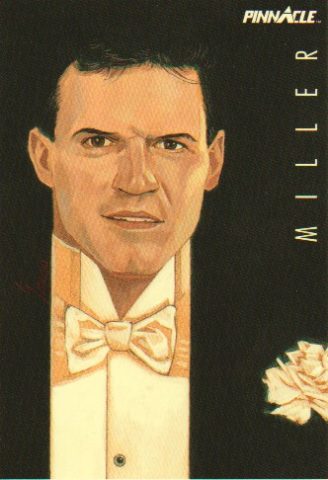
What started off as a physical contest had waned as the overtimes progressed, but both teams worked to get their way into shooting lanes and blocking shots and scoring chances, as neither team wanted to yield the final goal.
Lou Franceschetti broke in late in the third overtime and was tripped up by Tomas Jonsson, but still got off a shot just before the second 60 minutes came to a conclusion.
The Islanders outshot the Capitals for the first time in the third overtime, outgunning Washington 11-10, but the total was 74-52 for the Caps, and 39-31 for them through three overtimes – more than either team had produced in regulation.
As the clock wound past 1 a.m., the game became the longest played in 44 years, and then became the fifth-longest in NHL history.
The only food available was peanuts and frozen pretzels, and most of the writers at the time had packed up their gear and just observed history unfold since print deadlines had passed and the Sunday newspaper only ran a box score since the game had passed the printing of the newspaper.
Just after five minutes elapsed in the fourth overtime, Capital Centre public announcer Marv Brooks went on the microphone and said “And for those of you who have been asking, this is now the second-longest hockey game in U.S. history and the fifth-longest in all-time NHL history … but to let you know we’re still here.”
During the next stoppage, the “Twilight Zone” theme was played, eliciting some laughter from the fans who remained in the stands even as the game passed the six-hour mark – although some were falling asleep.
By that point, the scene just was surreal, as two teams who had tried to end the game had been stymied by the two goaltenders and both teams were showing fatigue from playing over 120 minutes of hockey in an era in which endurance wasn’t as prevalent as today. But the fans were fatigued as well, as the two teams in front of them were trying to simply survive the game and move on to a Patrick Division Final which would begin in what was now the next evening in Philadelphia.
LaFontaine Ends the Marathon
Just as both teams seemed to be losing steam, the game came to an abrupt end just before the clock struck 2 a.m.
Gord Dineen took the puck behind the Washington net, but his shot was blocked by Kevin Hatcher, and then went to LaFontaine who was just inside the blue line. He turned around and fired the puck with a slap shot past Langway, Dale Henry and a fallen Greg Adams and ended up beating Mason with a shot that made a loud clank as it hit the metal base of the net. The Islanders mobbed LaFontaine, while Mason fell to his knees and the Capitals slumped in defeat.
New York outlasted Washington in the fourth overtime, with the Capitals only getting one shot on goal in the seventh period before LaFontaine scored on the Islanders’ fifth shot of the frame.
Both goaltenders were spectacular, with Hrudey stopping 73 of 75 Washington shots, and Mason ending with 54 saves off 57 Islanders shots. Hrudey’s mark stood as an NHL record for saves by a goaltender in a single game for over 33 years, until it was broken in the 2020 playoff bubble by the Columbus Blue Jackets’ Joonas Korpisalo against the Tampa Bay Lightning – two teams that didn’t exist in 1987.
“I rarely ever felt sorry for the losing team but there was a tinge of sorrow for the Capitals in that one simply because when it goes that long it’s a toss-up, who knows who’s going to win that game,” Hrudey told Sportsnet in 2020. “I think both teams really proved a lot that night.”

“This was the greatest game in our history,” Capitals GM David Poile said at the time. “Have you ever seen a game where there were so many great scoring chances and so few goals? I mean ever in one game” (from “The Capitals-Islanders Easter Epic showed all that’s right and wrong about playoff hockey”, The Washington Post, May 8, 2020).
And LaFontaine sought out Mason, his 1984 U.S. Olympic teammate, after the celebration and told him simply, “I’m sorry” (from “The Capitals-Islanders Easter Epic showed all that’s right and wrong about playoff hockey,” The Washington Post, May 8, 2020).
Fornes recalled that the shock lasted well into the night for the Capitals.
“I couldn’t really believe it was over,” he said. “Later on, I became friends with Pat LaFontaine and we often talked about that goal and about that game. He’s a class act.
I guess the biggest thing I remember after the game was, I went downstairs after the wrap-up and went to the dressing room, this is maybe a half-hour after the game had ended, a lot of players were still in their gear.
“They were just numb. It was a one-of-a-kind game. I’ll never forget it. How do you outshoot a team 75-57, the Caps outshot the Islanders 75-57, and then to lose it on a turnaround shot like that.
That was the exact type of play it was going to take to win it, and Pat LaFontaine came through.”
Aftermath of an Epic
The Islanders didn’t arrive back on Long Island until mid-morning due to fog in Baltimore and then had to open the second round against the Flyers the following day, which meant a bus ride back down the East Coast. While the Islanders managed to rally again from a 3-1 series deficit in that series, this time they couldn’t win Game 7, falling to the eventual Stanley Cup Finalist.
Related: Capitals History: Hunter’s OT Goal Lifts Washington Past Flyers in 1988
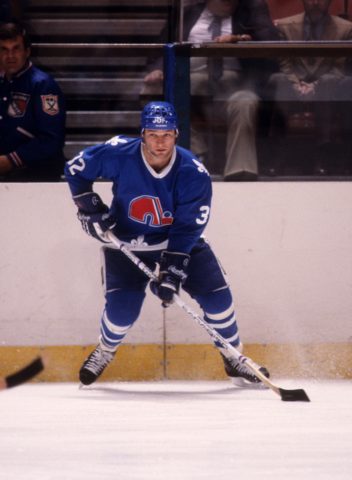
The Washington series was the true end of the Islanders’ run in the 1980s, while they qualified for the playoffs in 1988, they were knocked out in the first round and didn’t win another playoff series until 1993.
The Capitals went out and acquired Dale Hunter at the NHL Draft in June, and two days shy of the one-year anniversary, they managed to erase the Flyers’ 3-1 series lead and win a Game 7 in overtime themselves. Three years later, the Capitals reached their first Conference Final.
Just over nine years after the Easter Epic on April 24, 1996, two Capitals from that night, Miller and Michal Pivonka, skated in another four-overtime game at the Capital Centre, in Game 4 of their series against the Pittsburgh Penguins, which went longer than the Islanders game but also ended in disappointment.
However, those two longtime Capitals were rewarded for their efforts two seasons later as part of the Eastern Conference Champion team in 1998, with Miller dressing in the Stanley Cup Final for the first time in his career and Pivonka playing in the first three rounds before suffering a shoulder injury in Game 2 of the Eastern Final against the Buffalo Sabres.
The Capitals and Islanders, who met five straight seasons in the playoffs, have only met three other times in the 35 years since, with New York winning the 1993 rematch, and then Washington winning a Game 7 at home – which had since shifted to the District – in 2015. The Islanders then won a 2020 first-round series held in the bubble in Toronto.
As for the Capital Centre, which was torn down in 2002, one of the markers placed on the shopping mall that replaced the arena was a sign commemorating the site of the Easter Epic – a surreal contest that remains one of the greatest games – with one of the most exciting overtimes in NHL history 35 years later.